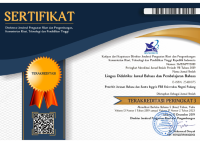THE SYSTEMIC FUNCTIONAL LINGUISTICS: THE APPROPRIATE AND INAPPROPRIATE USE OF DEVICES IN STUDENTS’ ACADEMIC TEXT
 ), Refnaldi Refnaldi(2), Rusdi Noor Rosa(3),
), Refnaldi Refnaldi(2), Rusdi Noor Rosa(3), (1) Lecturer of Universitas Negeri Padang
(2) FBS Universitas Negeri Padang
(3) FBS Universitas Negeri Padang
 Corresponding Author
Corresponding Author
Copyright (c) 2017 Lingua Didaktika: Jurnal Bahasa dan Pembelajaran Bahasa
DOI : https://doi.org/10.24036/ld.v10i2.7197
Full Text:
 Language : en
Language : en
Abstract
This qualitative research was conducted to describe the types of grammatical cohesive devices and to compare the frequency of using the appropriate and inappropriate of those devices used by students in composing analytical exposition text. The subjects of this research were chosen conveniently by selecting only 34 students of grade two of SMAN 7 Padang. The data was collected from the analytical exposition texts written by them. The result of this research shows that the students are able to use the grammatical cohesive devices in variant ways. Those four types found are reference, conjuction, ellipsis, and substitution. Reference and conjuction were found most frequent in students’ texts with the percentage of occurring those types were 62.77% and 31.88%. In adition, ellipsis dan substitusition, each of them gives contributes to students texts just 4.8% and 0.55%. Students tend to use the inappropriate pronoun reference when they try to refer between the subject and object in their sentences. Of 1104 times of using the devices, the most inappropriate use was located in using reference. The frequency of using these inapprorate references was 88 times.
Keywords
References
Azzouz, B. (2009). A discourse analysis of grammatical Cohesion in %student’s writing. Algeria: Mentouri University-Constantine.
Baker, M. (1992), In Other Word: A Coursebook on Translation, London: Routledge.
Gay, L.R. (1987). Educational Research: competencies for analysis and application. Third edition. Columbus: Merril.
Gerot, L. and Peter W. (1994). Making Sense of Functional Grammar. Sydney:Gerd Stabler.
Halliday, M.A.K & Hassan, R. (1976). Cohesion in English, London: Longman.
Halliday, M. A. K. (1994). Introduction to Functional Grammar. London: Edward Arnold.
Hatch, E. (1992). Discourse and Language Education, Cambridge: Cambridge University Press.
Hidayati. (2013). Mistakes and Error Analysis of Cohesive Features in Argumentative Essay of Fifth Semester Students of English Department of Jambi University. Pascasarjana, UNP
Knapp and Watkins. (2005). Genre, Text, Grammar Technologies for Teaching and Assessing Writing, Sidney: University of New South Wales Press.
Rosa, R, N. (2013). Thematic Progression as a Model Used to Keep Cohesion in Writing an Exposition Text. A Paper Presented in SELT, Padang 28th August.
Tangkiengsirisin, S. (2010). Enhancing Cohesion in Thai Postgraduate Students’ Expository Writing Through Feedback Delivery and Revision. England: University of Nottingham.
 Article Metrics
Article Metrics
 Abstract Views : 1804 times
Abstract Views : 1804 times
 PDF Downloaded : 557 times
PDF Downloaded : 557 times
Refbacks
- There are currently no refbacks.
Copyright (c) 2017 Lingua Didaktika: Jurnal Bahasa dan Pembelajaran Bahasa

This work is licensed under a Creative Commons Attribution-NonCommercial 4.0 International License.









